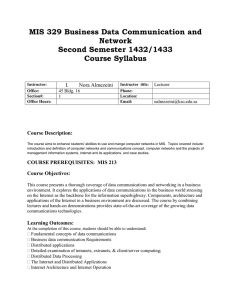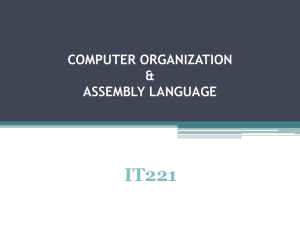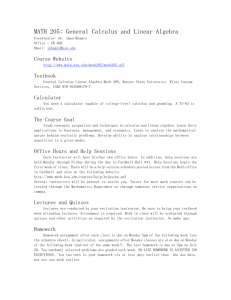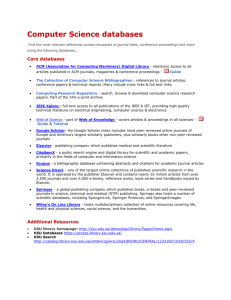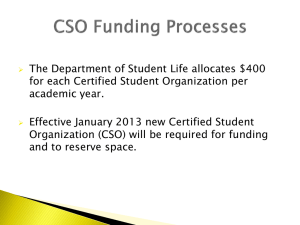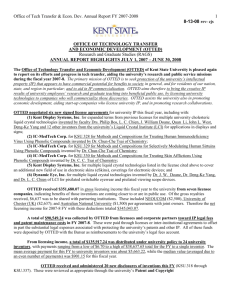MIS 201 Principles of Management Information Systems First
advertisement
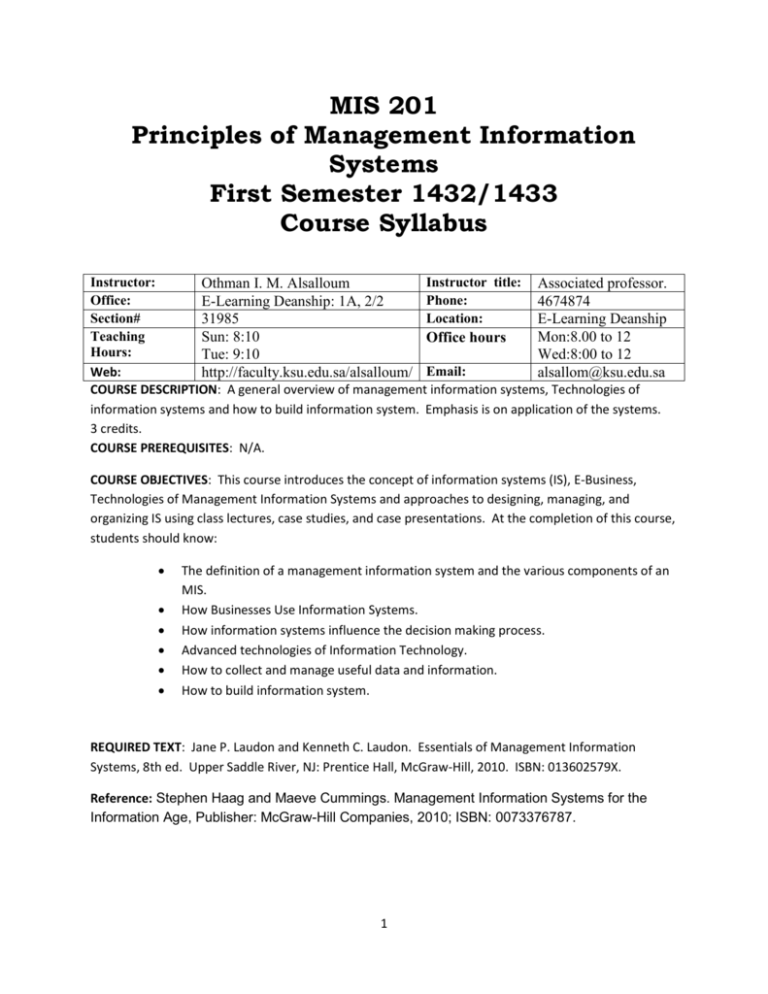
MIS 201 Principles of Management Information Systems First Semester 1432/1433 Course Syllabus Instructor: Instructor title: Associated professor. Othman I. M. Alsalloum Office: Phone: E-Learning Deanship: 1A, 2/2 4674874 Section# Location: 31985 E-Learning Deanship Teaching Sun: 8:10 Mon:8.00 to 12 Office hours Hours: Tue: 9:10 Wed:8:00 to 12 Email: Web: http://faculty.ksu.edu.sa/alsalloum/ alsallom@ksu.edu.sa COURSE DESCRIPTION: A general overview of management information systems, Technologies of information systems and how to build information system. Emphasis is on application of the systems. 3 credits. COURSE PREREQUISITES: N/A. COURSE OBJECTIVES: This course introduces the concept of information systems (IS), E-Business, Technologies of Management Information Systems and approaches to designing, managing, and organizing IS using class lectures, case studies, and case presentations. At the completion of this course, students should know: The definition of a management information system and the various components of an MIS. How Businesses Use Information Systems. How information systems influence the decision making process. Advanced technologies of Information Technology. How to collect and manage useful data and information. How to build information system. REQUIRED TEXT: Jane P. Laudon and Kenneth C. Laudon. Essentials of Management Information Systems, 8th ed. Upper Saddle River, NJ: Prentice Hall, McGraw-Hill, 2010. ISBN: 013602579X. Reference: Stephen Haag and Maeve Cummings. Management Information Systems for the Information Age, Publisher: McGraw-Hill Companies, 2010; ISBN: 0073376787. 1 SUPPLEMENTARY MATERIALS: The Companion Website provides additional resources that might be helpful to students, and it can be accessed at http://www.prenhall.com/. PowerPoint slides for all twelve chapters of the textbook are available . In order to conserve paper, students should print the slides in pure black and white and in a six-slide handout format. It is very important that students have these lecture notes available for discussion during every class. Course Outline: Week Chapter Description Week 1,2 Chapter 1 Business Information Systems in Your Career Week 3,4 Chapter 2 E-Business: How Businesses Use Information Systems Week 5,6 Chapter 4 IT Infrastructure: Hardware and Software First Exam Week 7,8 Chapter 5 Foundations of Business Intelligence: Databases and Information Management Week 9,10 Chapter 6 Telecommunications, the Internet, and Wireless Technology Second Exam Week 11, 12 Chapter 11 Building Information Systems and Managing Projects Week 14, 15 Review 2 GRADES: (The instructor abides by the following grading scale strictly and DOES NOT curve at all.) Description Quizzes, In-Class Assignments, and apiastsapas ripsrpitapiaitrap ptasisasti Percentage 20 Scale 95 - 100 Grade A+ Two Tests (20% each) Final (Comprehensive) Exam 40 40 Total 100% 90-94 85-89 80-84 75-79 70-74 65-69 60-64 < 59 A B+ B C+ C D+ D F 1. QUIZZES AND IN-CLASS ASSIGNMENTS: There will be online quizzes and a couple of in-class assignments administered throughout the semester. The deadlines for the online quizzes are stipulated in the Class Schedule and must be taken via the E-Learning and LMS system. Students who are absent on the day that we have an in-class assignment would have to take a zero for that in-class assignment grade. 2. TESTS: Tow tests, which focus primarily on materials covered in class and from the textbook, will be administered during the semester. Students are strongly encouraged to visit the Companion Website for additional coverage of the materials presented in the textbook. In order to perform well on the tests, students must be familiar with the definitions listed in the Key Terms section, and do all the questions listed in the Review Questions section. Students who cannot take the scheduled tests must discuss with the instructor in advance. Makeup tests and exam will not be given except with prior notification and under extenuating and unavoidable circumstances. The burden of proof of said circumstances is on the student. Makeup examinations will usually differ from the original exam, and may be essay or oral. 3. FINAL EXAM: A comprehensive exam will be given during the KSU University exam schedule. The format of the final exam is relatively similar to the format for the tests. 4. ATTENDANCE: The attendance policy follows the guidelines stated in the KSU Catalog ( http://www.KSU.edu.sa/). Students must assume full responsibility for any loss incurred because of absence, whether excused or unexcused. All work missed because of absences will receive a grade of zero. Excused absences are those resulting from the student’s participation in a University-sponsored activity, from recognizable emergencies, or from serious illness. Students are encouraged to participate actively in class discussion and presentation. 5. KSU HONOR CODE: All students must obey the KSU Honour Code diligently. The Honour Code is based on the need for trust in an academic community. KSU’s Honour Code is a system developed by and maintained for the welfare of its students, and all students should make sure 3 that they read and understand the provisions outlined in the Student Handbook (read http://www.ksu.edu.sa). All work completed for this course will be considered pledged. CHEATING IS ABSOLUTELY NOT TOLERATED AT KSU UNIVERSITY. Plagiarism is a violation of the honour code. All papers submitted in this course are subject to evaluation using plagiarism detection software. 6. ACADEMIC DISHONESTY POLICY: Cheating in any form will not be tolerated in the College of Business. If the instructor determines that a student has cheated on an assignment, the grade of “F” may be assigned for the entire course. “Cheating” is the use of unauthorized resources and/or work of another including but not limited to homework, tests, papers, presentations and exams. Unless specifically instructed otherwise, students are to assume that all coursework is to be the work of the individual student alone. If a student is unsure as to whether collaboration is permitted, the professor should be contacted in advance of performing the work. If a faculty member penalizes a student in a course for an Honour Code violation, they should also bring formal charges against the student with the University Honour Board. 7. LEARNING DISABILITIES: Any student who feels that he may need accommodations based on the impact of a physical, psychological, medical, or learning disability should contact Students' Affair Office. 8. INCLEMENT WEATHER POLICY: In cases of inclement weather, commuter and campus based disabled students will be permitted to make decisions about whether or not to attend classes without penalty. If the University is open, it is expected that residence students will attend all classes being held that day. Cancelled classes will not be rescheduled since students should utilize the cancelled class period as computer lab time. 9. COMMENTS: The instructor reserves the right to make any appropriate and necessary changes to the Course Syllabus and Class Schedule. Students are responsible for all materials covered in class as well as materials in the textbook. If you must be absent, the instructor assumes that you have obtained notes from a classmate. Any student having difficulty with the materials should make an appointment to see the instructor. Private conversations between students are disruptive and annoying to both the instructor and other students. Therefore, students with disruptive and annoying behaviours are dismissed from class until the behaviour is under control. 4
